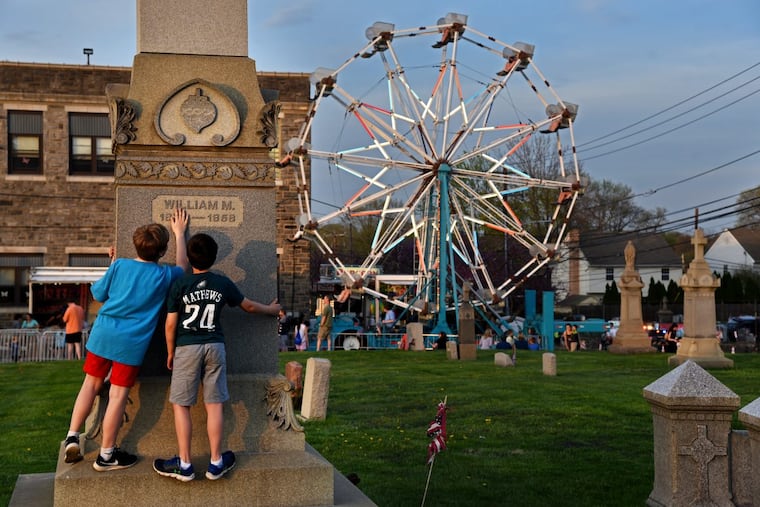St. Denis Fun Fair: I dare you to say this Havertown tradition, now 50, will ever die. | Maria Panaritis
One of the most well known spring carnivals in the Philadelphia region just turned 50. The St. Denis Fun Fair is the very definition of resilience.

Vince Gorski was like a guy on a mountaintop as he stood on asphalt at the St. Denis Fun Fair and watched children squeal from a tiny purple roller coaster.
The 80-year-old chatterbox has an ageless energy — his hair is barely gray, his face a dead ringer for 65 — and he's convinced there's magic in the small Havertown church carnival, celebrating its 50th birthday this year.
"You can't see it," Vince said, the roaring coaster whipping and dipping kids barely old enough for kindergarten. "You can't touch it. But it's there."
The coaster, the homemade carnival booths, all the rides stuffed onto every conceivable square inch are known well beyond the inner-ring borders of this, Delaware County's oldest Catholic parish. They are beloved.
But not because this is a fancy, sprawling mecca in the wide-open suburbs. St. Denis is an enchanting throwback, squeezed into one of the most densely populated communities west of Philly. Its buildings are wedged between cemeteries that themselves are wedged among homes, all of which encircle the eight-day encampment of rides, gambling and concessions that make this Fun Fair such a trip back in time.
It hasn't stuck around this long by accident.
Guys like Vince, who helped run the fair for years after it was founded in 1969, couldn't help but pass along his obsession to his seven kids. He lived and breathed a Mummers-like, year-round commitment that made guys like him and now his youngest son, 46-year-old carnival chairman Chris Gorski, known as husbands of "Fun Fair Widows."
Want proof?
Imagine you're me this past Thursday night on Day One of the two-week carnival, which runs Wednesdays through Saturdays. Dad Gorski waltzes me to a game that he and his son, an engineer, built by hand.
It's a replica of SEPTA's Norristown High-Speed Line.
Yes, you read that correctly. The regional trolley line that stretches through this community west from 69th Street in Upper Darby. A carnival game inspired by the Southeastern Pennsylvania Transportation Authority.
You pay $2 for a one-in-22 chance that the trolley, once set in motion along a low-friction track, will land on the stop you bet on.
"Look at the welding in here," Vince says, poking inside the contraption engineered by his design-crazed son. It's even got computer components and a flashing winner's board.
As Vince is showcasing this Frankenstein-trolley, Vince's son is elsewhere, running around with a pair of needle-nose pliers dangling from his back pocket. Chris is frantically trying to fix get the cash registers connected to the internet. Oh — and the deep fryers are on the fritz, too.
I look at the trolley. I'm listening. And, of course, I toss a zinger Vince's way.
"That's a lot of time Chris spent building that game," I say. "Imagine if he'd spent all that time investing in the stock market."
Vince laughs.
Chris also spent the final months of his wife's last pregnancy designing and building — with an attached spiral staircase — a towering replica of the famous Price Is Right game we Children of the Seventies fondly recall as "Plinko."
"What's amazing," Vince says, leaning into me, "is that he's not divorced."
That's really the secret here. This church and grade school fund-raiser still comes alive because there are volunteers who consider it their life's duty to keep it going. Tons of them.
Strangers in the pews become friends on the fairgrounds. They defy the vicious determination of the modern age to handcuff younger families with too-busy lives filled with full-time jobs and task-mastery.
Other carnivals have shrunk, closed, or outsourced their booths to third party operators and get only a cut of the proceeds. At St. Denis? No way. They've stuck to a mantra once embodied by one of the fair's founders, the late John Savini.
"What do you mean we can't get that for free?" is how Vince describes Savini's enduring worldview.
That means a guy like parishioner Harry Mesi will spend all eight days of the carnival in the church basement cooking sausages and making funnel cake batter. Until just a few years ago, he used a drill, a spackle paddle, and a bucket.
"Our deep-fried Oreos are absolutely the best — bar none," he proclaims as a group of guys surround him to shoot the breeze as he cooks.
Chris Gorski was 4 when he started hanging out with his dad here. How could he not fall in love with it? His dad, a sales guy by day, became a wizard who turned the church into a wonderland for kids each spring.
"My father was a chair who ran it for 15 years," Chris says. "Then I got the bug. Then my brothers got the bug."
Some places are built with tough in their DNA. St. Denis is one of them. Two towering obelisks in one of its two cemeteries are monuments to the never-say-die spirit of this place. The side-by-side gravestones belonged to two Irish parishioners with a lifelong rivalry of one-upmanship that continued even after death.
From the top of the Fun Fair Ferris wheel, you can see the obelisks. And the Fun Slide, the Fun House, and the the gravestones of many people who laughed or squealed or met their spouse at this carnival.
But one hard-to-see headstone seems to best capture the spirit of this place and and these people.
It's a smaller one, far away from the rides, with an inscription that stops you in your tracks: Suffering Is Optional.
At St. Denis, too, so is giving up.